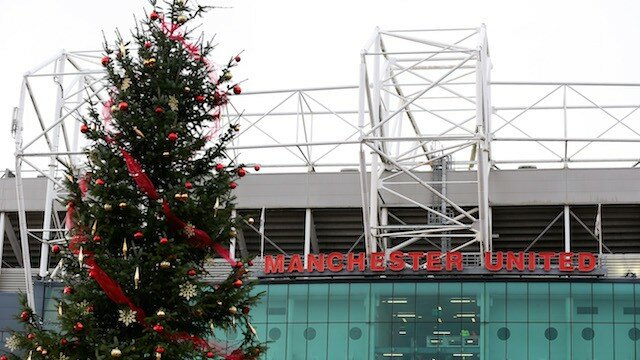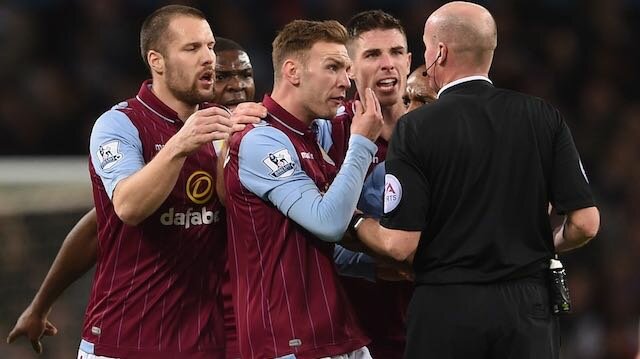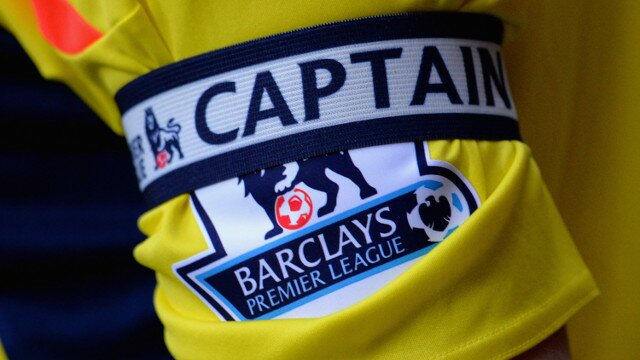Football Association Right On Reversing Aston Villa Red Card But Wrong For Not Punishing Referee Lee Mason
Sometimes the referee’s decision isn’t always final.
England’s Football Association may have gotten it right by reversing a red card for Aston Villa’s Gabriel Agbonlahor, but they then made a terrible decision in not punishing referee Lee Mason for his controversial call. Somehow Mason has emerged unscathed and managed to retain his Premier League referee status for the next round of matches, as he will take charge of Everton’s clash with Stoke City on Friday.
Mason’s highly questionable sending off occurred in the 65th minute of Saturday’s clash against Manchester United at Villa Park when Agbonlahor clattered into Ashley Young at midfield in what most observers saw as a 50-50 challenge.
Agbonlahor had lost control of the ball and in his attempt to retain possession smashed into Young who hit the ground as if he had suffered a broken leg. Young quickly got back to his feet after the decision.
The call was a joke. The entire Villa team crowded around Mason to protest the decision after he had reached into his pocket to produce red. The referee’s decision would have been more of a mess for Mason if shorthanded Villa fell to United, but they hung on to steal a point.
Young, a former Villa player who was booed every time he touched the ball, even admitted after the match he was surprised by the decision and thought he was actually the one guilty of a foul on the play. Villa boss Paul Lambert criticized the decision and announced the team would file an official protest with with Professional Game Match Officials boss Mike Riley.
“There was nothing [in the challenge], you may as well pack up if you’re going to take tackling out of the game,” Lambert said. “The two have gone in [for the ball] without any malice or studs showing, that’s not a red card.”
It’s not the first time — or the last — we have seen controversial decisions from Mason.
In 2012, Mason was also all too quick to reach for a red card in another decision, again involving Young, after he was felled by Shaun Derry of Queens Park Rangers. Mason also awarded a soft penalty kick and both decisions were blasted by QPR manager Mark Hughes, who now manages Stoke.
Last season Liverpool boss Brendan Rodgers was fined $12,000 for blasting Mason after he rubbed out a first-half goal by Raheem Sterling and allowed repeated fouling of former striker Luis Suarez in a Boxing Day clash against Manchester City. Some referee pundits have even gone so far to suggest that Mason — who is from the greater Manchester area — actually has a bias for his neighborhood teams.
But the big question remains: Why is Mason still on this week’s Premier League match assignment list? In the past, others have not been so fortunate to escape the wrath of the Football Association.
Referee Andre Marriner was demoted to league championship action for a weekend after his bogus penalty kick decision which gave Manchester City a 1-0 victory over Everton on Dec. 6.
In April 2013, former referee Howard Webb was sent down to the second rung of English soccer after controversial calls in the Tyne Derby between Newcastle United and Sunderland.
So what gives? How did Mason end up staying on the referee assignments list?
If the FA was concerned enough to actually allow a rare reversal on a botched call Mason should logically face punishment and reprimand.
Brace yourselves, Potters and Toffies fans; you could be in for a long afternoon when Mason takes charge of Friday’s match.
Peter Mallett is a blogger for www.RantSports.com. Follow him on Twitter @RedCardTheRef1 like him on Facebook or add him to your network on Google.
Liverpool vs. Swansea City: Final Score Prediction
Anfield plays host to the meeting of Liverpool and Swansea on Monday as both sides look to round the year off with a win. Read More
Tottenham vs. Man United: Final Score Prediction
Sunday pits Tottenham against Manchester United in the Premier League. Here's a final score prediction for the match. Read More
Southampton vs. Chelsea: Final Score Prediction
Another fantastic fixture to keep you entertained this holiday season sees Southampton take on Chelsea. Here's a final score prediction. Read More
5 Bold Predictions for Arsenal vs QPR
QPR is yet to win on the road this season. Here are five predictions for their game against Arsenal Emirates Stadium. Read More
5 Bold Predictions for Man U vs. Newcastle
Manchester United will take on Newcastle at Old Trafford. The Red Devils look to keep pace with the top two. Read More
Real Madrid: Best Side in History?
Are the current crop of Los Blancos the best side in footballing history? Read More
5 Bold Predictions for Chelsea vs. West Ham
Chelsea welcome West Ham for Week 18 action in the EPL. Here are five bold predictions for the match-up at Stamford Bridge Read More
Top 5 Players in First Half of Bundesliga Season
The Bundesliga has provided many quality performances in the first half of the 2014-15 season, but the five players have distanced themselves from the rest of the field. Read More
5 Players Stoke City Could Target In January
Stoke City will need to reinforce their squad if they hope to continue to avoid the relegation zone in the second half of the EPL season. Here are five players the Potters may target in the new year. Read More
10 EPL Stars Who Need to Step Up In Week 18
Here are the 10 players in the EPL who need to step up big this weekend. Read More
Erick Torres a Perfect Fit With Houston Dynamo
The acquisition of Erick "Cubo" Torres by the Houston Dynamo is a perfect fit not just for on the field play, but also for ticket and merchandise sales. Read More
Cavani Should Be Liverpool's Priority
With Mario Balotelli being tipped for an exit and Liverpool in dire need for a striker, Liverpool should make Edinson Cavani their priority not Saido Berahino. Read More






















